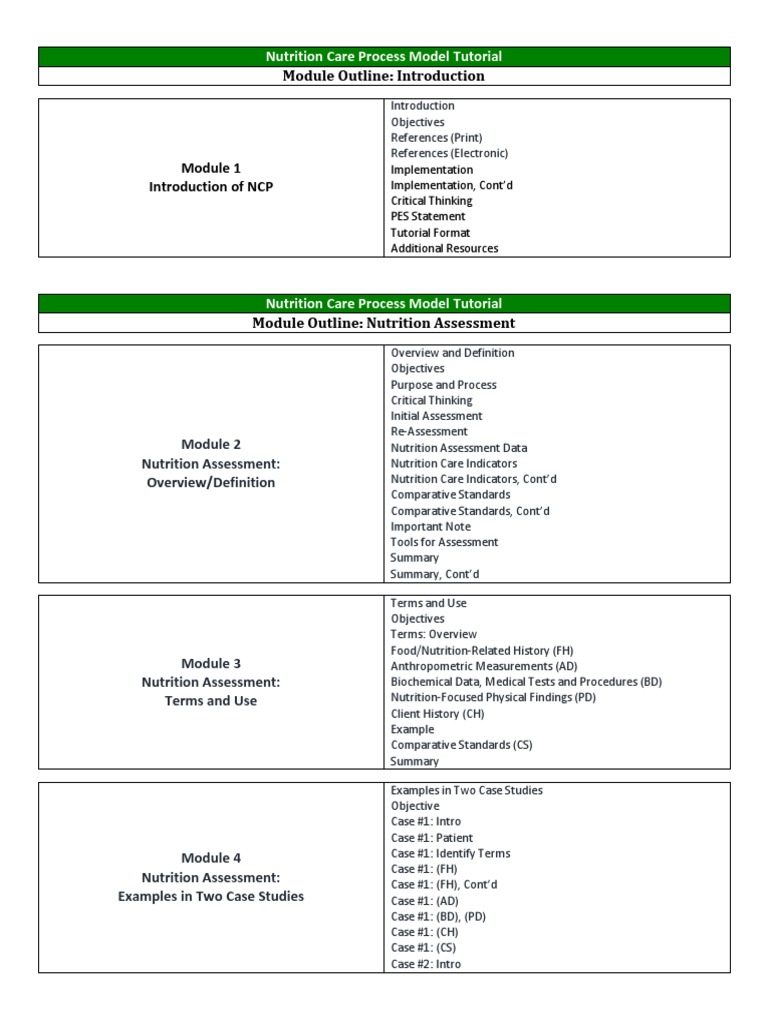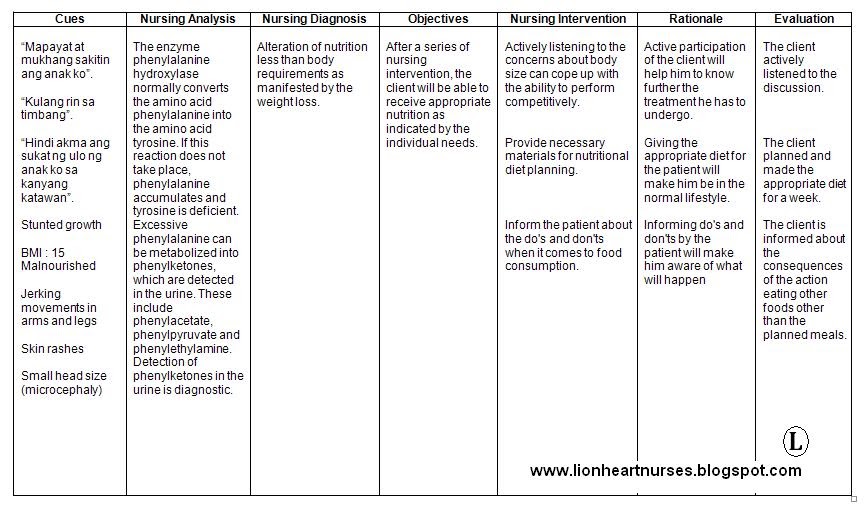As healthcare professionals, we all know the importance of good nutrition in maintaining optimal health. Proper nutrition not only ensures that our body has the necessary nutrients to function properly, but it also helps in preventing chronic diseases and promoting overall wellbeing. In this post, we will discuss the priority nursing diagnosis of nutrition and how it plays a crucial role in ensuring the health of our patients. The Priority Nursing Diagnosis of Nutrition The nursing diagnosis of nutrition is linked to the inadequate supply of nutrients to the body. It is a critical diagnosis as it can lead to malnutrition and other complications. The nursing process for the diagnosis of nutrition starts with thorough assessment and evaluation of the patient's nutritional status. This includes a complete medical history, physical examination, and psychological evaluation. It also involves reviewing the patient's dietary habits, food intake, and fluid balance. The priority nursing diagnosis for nutrition is a complex process that depends on the unique needs of each patient. However, the most commonly observed nursing diagnosis related to nutrition is alteration in nutrition less than the body requirements. This diagnosis is characterized by inadequate intake of essential nutrients which can lead to malnutrition, weight loss, and weakened immune system. Possible Causes of Alteration in Nutrition Less than the Body Requirement Several factors can contribute to the nursing diagnosis of alteration in nutrition less than the body requirements. Some of the most common causes are: 1. Poor Dietary Habits: Eating unhealthy and low-nutrition meals can lead to malnutrition and weakened immune system. 2. Medical Conditions: Chronic illnesses such as kidney diseases, diabetes, cancer, and gastrointestinal diseases can cause malabsorption of essential nutrients. 3. Medications: Certain medications such as chemo drugs, antibiotics, and laxatives can cause the body to absorb fewer nutrients. 4. Psychological Factors: Mental health issues such as depression, anxiety, and eating disorders can lead to a lack of interest in food and reduced food intake. Assessment and Evaluation of the Patient To make an accurate nursing diagnosis related to nutrition, it is crucial to assess and evaluate the patient thoroughly. This includes the following: 1. Medical History: Thorough review of the patient's medical history can provide insight into any underlying conditions that may contribute to inadequate nutrient intake. 2. Physical Examination: Physical examination can help identify any physical symptoms of malnutrition. This may include weight loss, muscle weakness, dry skin, and brittle nails. 3. Dietary Habits: Assessment of the patient's dietary habits can help identify any unhealthy eating patterns that may contribute to poor nutrition. 4. Blood Tests: Blood tests can provide valuable information on nutrient levels in the body. This may include serum albumin, total protein, and hemoglobin levels. Intervention and Treatment The nursing diagnosis of alteration in nutrition less than the body requirements requires prompt intervention and treatment. The ultimate goal is to restore the patient's nutritional status and prevent further complications. Some of the intervention and treatment options are: 1. Nutritional Counseling: Nutritional counseling can educate the patient on healthy dietary habits and promote nutritious food choices. 2. Balanced Diet: Promotion of balanced diet emphasizing the intake of essential nutrients, and limiting intake of high-calorie and high-fat foods can help meet the body's nutrient requirements. 3. Nutrient Supplements: In cases where the patient is unable to meet the nutrient requirements through food choices, nutrient supplements such as vitamins, minerals, and protein shakes can help meet the requirements. 4. Psychological Counseling: For patients with mental health issues such as depression, anxiety, and eating disorders, psychological counseling can help restore their emotional wellbeing and promote healthy eating habits. Conclusion Nutrition is a critical aspect of healthcare, and good nutrition is essential for maintaining optimal health. The nursing diagnosis of nutrition is linked to inadequate intake of essential nutrients, malnutrition, and weakened immune system. The priority nursing diagnosis for nutrition is alteration in nutrition less than the body requirements. The nursing process for diagnosing nutrition involves assessment, evaluation, intervention, and treatment. Thorough assessment and evaluation of the patient can help identify the causes of poor nutrition, and prompt intervention and treatment can help restore the patient's nutritional status and prevent further complications. So, let us all make an effort to eat healthy and maintain good nutrition, not just for ourselves but also for our patients. As healthcare professionals, we play a crucial role in promoting and ensuring the overall wellbeing of our patients, and good nutrition is a crucial component of that. Let us all make a conscious effort to live a healthy lifestyle and maintain good nutrition habits.
If you are looking for Priority Nursing Diagnosis Nutrition | Nutrition | Medical Diagnosis you've visit to the right page. We have 7 Pictures about Priority Nursing Diagnosis Nutrition | Nutrition | Medical Diagnosis like Diagnosis: Imbalanced Nutrition Nursing Diagnosis, Ncp-Imbalanced-Nutrition - Cues Nursing Diagnosis Inference Goal and and also 7 Nursing Diagnosis and Intervention for Cirrhosis - Nursing Care Plan. Here it is:
Priority Nursing Diagnosis Nutrition | Nutrition | Medical Diagnosis
 www.scribd.com
www.scribd.com nutrition priority
Ncp-Imbalanced-Nutrition - Cues Nursing Diagnosis Inference Goal And
 www.studocu.com
www.studocu.com imbalanced ncp diagnosis studocu inference cordilleras
Lionheart Nurses Blog: Nursing Care Plan : Alteration Of Nutrition Less
 lionheartnurses.blogspot.com
lionheartnurses.blogspot.com nutrition nursing plan care body imbalanced than requirements less weight diagnosis loss altered related nutritional intake manifested alteration intervention food
Diagnosis: Imbalanced Nutrition Nursing Diagnosis
 diagnosistolik.blogspot.com
diagnosistolik.blogspot.com nursing diagnosis nutrition imbalanced nanda body lice than requirements constipation medicinebtg pregnant prevalence original
Nursing Diagnosis For Imbalanced Nutrition Less Than Body Requirements
 artbooksdocs.blogspot.com
artbooksdocs.blogspot.com imbalanced ncp nursing hypoglycemia diagnosis nutritional etiology altered inadequate intake imgv2
Nutrition Nanda Nursing Diagnosis | MedicineBTG.com
 medicinebtg.com
medicinebtg.com nanda diagnosis medicinebtg
7 Nursing Diagnosis And Intervention For Cirrhosis - Nursing Care Plan
 ncp-nursingcareplan.blogspot.com
ncp-nursingcareplan.blogspot.com nursing diagnosis nutrition imbalanced intervention body less than plan care fluid volume requirements excess cirrhosis related ncp
Nutrition priority. Nutrition nanda nursing diagnosis. Imbalanced ncp nursing hypoglycemia diagnosis nutritional etiology altered inadequate intake imgv2
 www.scribd.com
www.scribd.com  www.studocu.com
www.studocu.com  lionheartnurses.blogspot.com
lionheartnurses.blogspot.com  artbooksdocs.blogspot.com
artbooksdocs.blogspot.com  medicinebtg.com
medicinebtg.com  ncp-nursingcareplan.blogspot.com
ncp-nursingcareplan.blogspot.com
Post a Comment for "Nutrition Nursing Diagnosis Nursing diagnosis nutrition imbalanced nanda body lice than requirements constipation medicinebtg pregnant prevalence original"